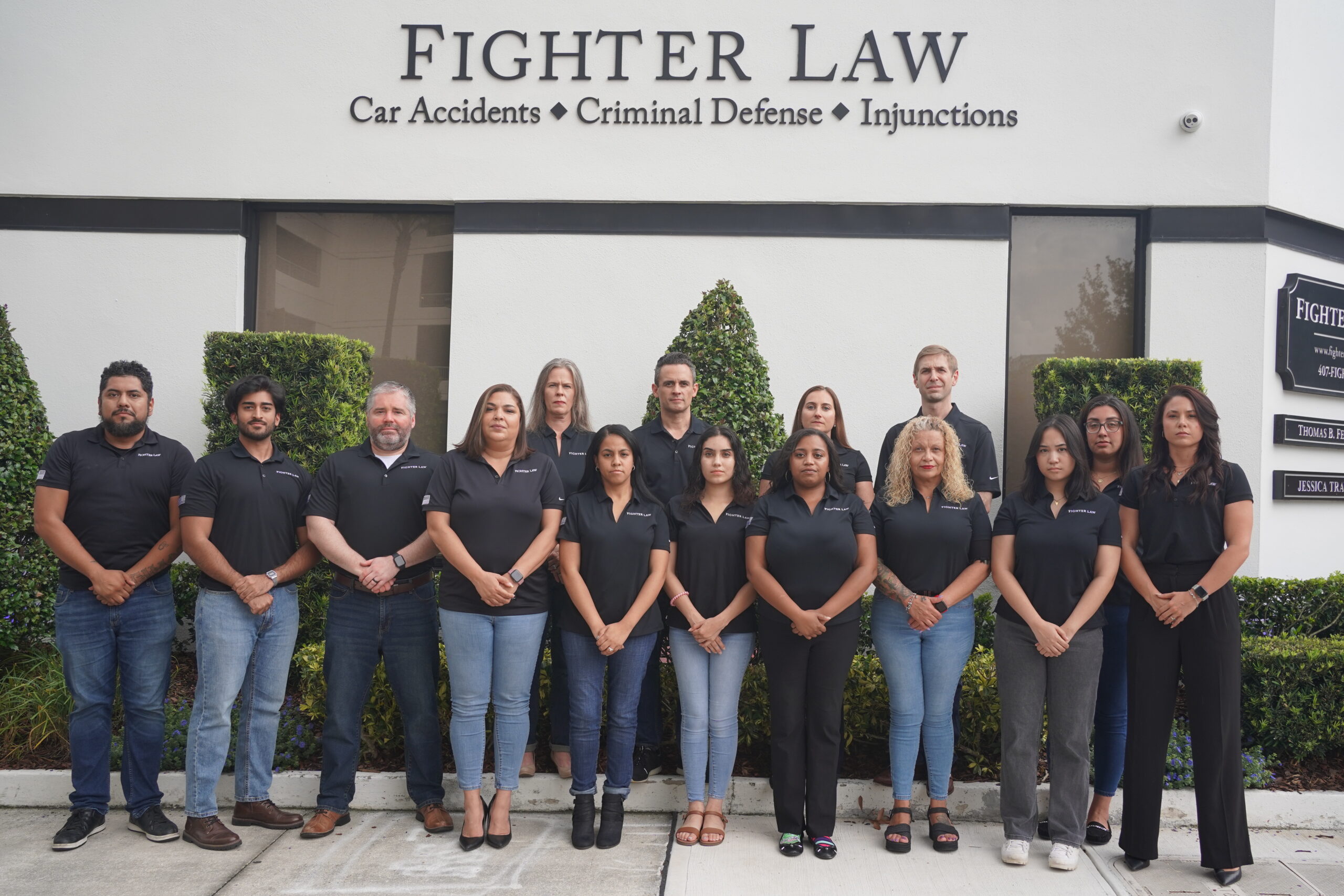Orlando Murder and Manslaughter Lawyer
When facing the devastating aftermath of a death that leads to criminal charges, understanding the legal distinctions between murder and manslaughter becomes critically important. These charges represent some of the most serious offenses in Florida’s criminal justice system, carrying life-altering consequences including decades of imprisonment or even the death penalty. Our experienced criminal defense team at Fighter Law has successfully defended numerous clients facing homicide charges, employing strategic legal defenses tailored to each unique case.
Murder and Manslaughter in Florida Criminal Law
In addition to murder and manslaughter, our firm handles a wide range of serious criminal offenses, including aggravated assault, aggravated battery, grand theft, violent crimes, sex offense, white collar crimes, federal charges, juvenile crimes, and domestic violence charges. These cases can result in harsh penalties such as prison time, jail time, loss of professional license, and a permanent criminal record. A criminal conviction can also affect your employment, lead to driver’s license suspension, and impact your future opportunities. The state attorney’s office prosecutes these criminal offenses, and prior convictions can increase the severity of penalties. Our legal team has extensive experience practicing criminal law, including conducting numerous jury trials, and includes former prosecutors who understand prosecution strategies.
As Orlando criminal defense attorneys, Orlando criminal defense lawyers, Orlando criminal attorneys, and defense lawyers serving Orlando, FL and Orange County, we are known for our legal knowledge, dedication, and results. The right criminal defense lawyer or defense attorneys can make a significant difference in the outcome of your criminal defense case. We can help you pursue criminal charges dismissed, negotiate a plea bargain, or decide whether to plead guilty, depending on your circumstances. Our attorneys are graduates of law school, including Florida college programs, and bring the experience and legal expertise needed to protect your rights.
Our attorneys are often interviewed by local news networks – like in the case below involving the Stephan Sterns first-degree capital murder case of Madeline Soto.
In Florida, murder and manslaughter are both serious criminal offenses that involve the unlawful killing of another person. However, the key differences between the two charges lie in the intent, the degree of recklessness or negligence, and the circumstances surrounding the killing. Both crimes are classified under Florida’s criminal code, but they carry significantly different penalties and legal implications.
If you have been wrongly accused or are facing criminal charges—including those related to child custody, domestic violence, or any family law matter, contact us today for a free consultation with our experienced attorneys.
Murder in Florida
Murder is the most severe form of homicide and involves the intentional killing of another person. Under Florida law, murder is classified into three degrees: first-degree murder, second-degree murder, and third-degree murder. The degree of murder charged depends on the intent of the defendant and the circumstances surrounding the killing.
- First-Degree Murder: This is the most serious charge, involving premeditation, meaning the defendant planned the killing before carrying it out. It can also involve felony murder, where a person dies during the commission of a dangerous felony (e.g., robbery, sexual assault, arson, aggravated assault, aggravated battery). Penalties for first-degree murder include life imprisonment or death if convicted.
- Second-Degree Murder: This charge involves an intentional killing, but without premeditation. Second-degree murder also includes cases where the defendant acted with a depraved mind, showing extreme disregard for human life. It may also apply when someone kills another during the commission of a non-felony act but without intent to kill. The penalty for second-degree murder is up to life imprisonment.
- Third-Degree Murder: This is a lesser charge than first- or second-degree murder, typically applied when a person causes the death of another through reckless conduct or during the commission of a non-violent felony. It is classified as a felony of the third degree, and the penalty can be up to 15 years in prison.
The state attorney’s office aggressively prosecutes violent crimes such as murder, aggravated assault, and aggravated battery. Having experienced criminal defense attorneys with strong legal knowledge is crucial to effectively defend against these serious charges.
Manslaughter in Florida
Manslaughter is a lesser charge than murder and typically involves situations where the defendant causes the death of another person, but without the intent to kill. In Florida, manslaughter is classified as either voluntary manslaughter or involuntary manslaughter.
- Voluntary Manslaughter: This occurs when a person kills another in the heat of passion or as a result of a provocation that would cause a reasonable person to lose self-control. This type of manslaughter is often referred to as a “crime of passion.” For example, if a person discovers their spouse committing adultery and kills the person in a fit of rage, they may be charged with voluntary manslaughter. The defendant’s actions are considered unreasonable, but the emotional distress at the time of the killing mitigates the charge from murder. Voluntary manslaughter is a second-degree felony in Florida, carrying a penalty of up to 15 years in prison.
- Involuntary Manslaughter: Involuntary manslaughter involves the unintentional killing of another person due to criminal negligence or reckless behavior. This is the least severe form of homicide, where the death results from actions that are unlawful or grossly negligent but not intentional. An example might include a fatal car accident caused by reckless driving or excessive speeding. Involuntary manslaughter is also a second-degree felony under Florida law, with penalties of up to 15 years in prison.
Potential Defenses for Murder and Manslaughter Charges in Orlando
Facing murder or manslaughter charges is one of the most serious legal situations anyone can encounter. If you have been wrongly accused, it is crucial to seek legal counsel from defense lawyers who are skilled defense attorneys. Having the right criminal defense lawyer can make a significant difference in the outcome of your case by protecting your rights and providing effective defense strategies. However, the law provides several potential defenses that can be used to protect your rights and challenge the accusations against you. Below are detailed explanations of some common defenses that may apply to these cases in Florida:
Self-Defense or Defense of Others
Florida’s Stand Your Ground law allows individuals to use force, including deadly force if they reasonably believe it is necessary to prevent imminent death or serious bodily harm. This law also extends to the defense of others. To successfully argue self-defense, we would need to demonstrate that your actions were proportionate to the threat you faced and that you had a legal right to be where the incident occurred. For example, if someone attacked you in your home or a public place, we may argue that your response was both necessary and justified under the circumstances.
Lack of Intent or Premeditation
Intent is a crucial element of most murder charges, especially first and second-degree murder. Without proof of intent to kill or premeditate the act, the prosecution’s case weakens significantly. If there is evidence suggesting that the death was accidental or occurred without any prior planning, this may result in reduced charges, such as third-degree murder or manslaughter. For example, if a death resulted from a heated argument that escalated without forethought, we might challenge the prosecution’s ability to prove intent beyond a reasonable doubt.
Accidental Death Without Negligence
When the death of another person is unintentional and occurs without criminal negligence, it may be classified as an accident rather than a crime. For involuntary manslaughter charges, we might demonstrate that your actions did not meet the threshold of gross negligence or recklessness. For instance, if a fatality occurred during an unforeseeable chain of events despite reasonable precautions, this could be a strong defense.
Insanity or Mental Incapacity
The legal defense of insanity is applicable when a defendant cannot distinguish right from wrong due to a severe mental illness or defect at the time of the crime. Florida follows the M’Naghten Rule for insanity defenses, which requires evidence that you were unable to understand the nature or consequences of your actions. While this defense can be complex and requires extensive expert testimony, it may mitigate or eliminate criminal responsibility in some cases.
Mistaken Identity or Wrongful Accusation
Mistaken identity is a leading cause of wrongful convictions, particularly in cases relying heavily on eyewitness testimony or circumstantial evidence. If we can demonstrate that someone else may have committed the crime or that the evidence used to identify you is unreliable, this could significantly undermine the prosecution’s case. Surveillance footage, DNA evidence, or inconsistencies in witness statements can all support a mistaken identity defense.
Lack of Credible Evidence
The prosecution carries the burden of proving guilt beyond a reasonable doubt. If key evidence is missing, improperly collected, or lacks credibility, it could weaken their case. For example, forensic evidence that is inconclusive or mishandled can cast doubt on the reliability of the state’s claims. Additionally, we can scrutinize the testimony of witnesses who may have motives to lie or provide inaccurate accounts of events.
Alibi Defense
An alibi defense is one of the most direct ways to refute accusations. If you were in a different location at the time of the incident, we could use evidence such as phone records, video surveillance, or witness testimony to corroborate your account. This can conclusively show that you could not have been involved in the crime.
Duress or Coercion
In rare cases, a defendant may argue that they committed the act under duress or coercion. For this defense to apply, we would need to show that someone forced you to act against your will by threatening you with serious harm or death. This defense often applies when the defendant had no reasonable opportunity to escape the situation or seek help.
Provocation
In cases of voluntary manslaughter, provocation can be a mitigating factor. If the defendant acted in the heat of passion as a direct result of being provoked, it may reduce a murder charge to manslaughter. This defense requires showing that the provocation was sufficient to cause a reasonable person to lose self-control and that the act occurred before the defendant had time to cool off.
Police Misconduct or Procedural Errors
If law enforcement violated your constitutional rights during the investigation, such as conducting an illegal search or failing to properly administer Miranda warnings, the evidence they gathered may be excluded from the case. This can weaken the prosecution’s position and, in some cases, result in a dismissal of charges.
Elements of Murder and Manslaughter
To secure a conviction for either murder or manslaughter, the state must prove specific elements beyond a reasonable doubt.
- Murder:
- First-Degree Murder: The prosecution must prove that the defendant premeditated the killing or caused a death while committing a felony (e.g., robbery or burglary).
- Second-Degree Murder: The prosecution must prove that the defendant intentionally killed someone or acted with depraved indifference to human life.
- Third-Degree Murder: The prosecution must show that the defendant caused the death of another person through reckless behavior or while committing a non-violent felony.
- Manslaughter:
- Voluntary Manslaughter: The state must show that the defendant killed in a heat of passion or due to provocation that would cause a reasonable person to lose self-control.
- Involuntary Manslaughter: The state must prove that the defendant’s actions were reckless or negligent, leading to the unintentional death of another person.
Penalties for Murder and Manslaughter
The penalties for murder and manslaughter in Florida vary depending on the degree of the offense and the specific circumstances of the case.
- Murder: The penalties for murder depend on the degree of the charge. First-degree murder can lead to life in prison or the death penalty. Second-degree murder carries a penalty of up to life imprisonment, while third-degree murder can result in up to 15 years in prison.
- Manslaughter: Both voluntary and involuntary manslaughter are second-degree felonies, carrying a maximum sentence of up to 15 years in prison. However, sentences can vary depending on the circumstances, such as the defendant’s prior criminal history or if a firearm was involved.
Why Choose Fighter Law?
At Fighter Law, we fight relentlessly for those facing serious criminal charges like murder and manslaughter because we understand what’s at stake. With decades of experience, board-certified trial lawyers like Thomas Fighter and Jessica Travis bring unparalleled legal acumen to your case. Thomas Fighter, named Board Certified Lawyer of the Year by The Florida Bar, and Jessica Travis, a seasoned former prosecutor, know how to navigate the complexities of Florida law and build a defense tailored to your situation.
We stand out for our personalized approach and dedication to client communication. From day one, we work closely with you to understand your unique circumstances, craft the strongest possible defense, and keep you informed every step of the way. Contact our office to learn more.
The Sarah Boone Case – 2nd Degree Murder Conviction
The Sarah Boone case involves a Florida woman who was charged with second-degree murder in the death of her boyfriend, Jorge Torres Jr., in 2020. Boone allegedly placed Torres inside a suitcase during a heated argument, and when he could not escape, he suffocated to death. Boone filmed part of the incident, laughing and making statements about her actions. The prosecution argued that Boone’s conduct demonstrated depraved indifference to human life, which is a key element of second-degree murder. Unlike first-degree murder, which requires premeditation, second-degree murder involves an intentional killing or one that occurs with a reckless disregard for human life. Boone’s actions, especially her failure to provide aid or attempt to stop the situation, led to the charge of second-degree murder. This case highlights how the prosecution can argue that a defendant’s actions reflect extreme recklessness or disregard for the victim’s life, even if the defendant did not specifically plan the death.
As an expert criminal trial lawyer, Attorney Thomas Fighter was interviewed by Fox 35 News before the defendant was sentenced in this case.








